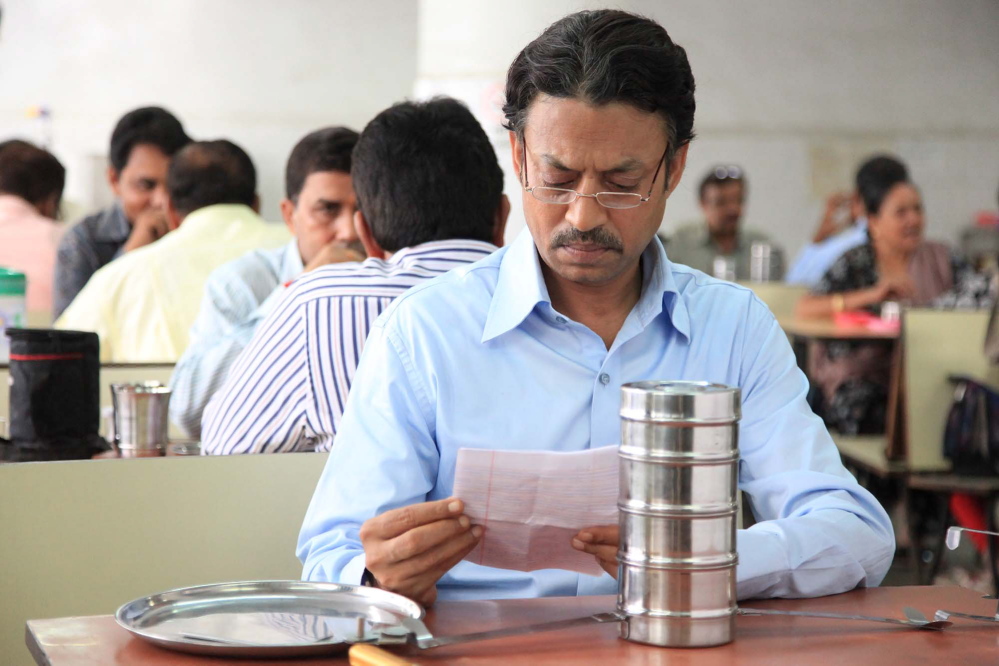“Sometimes the wrong train can take you to the right place.”
— Ritesh Batra
Deep in the vast network of ancient neighborhoods that thread through Mumbai, India’s most populous city, a lovely young woman, Ila (Nimrat Kaur) sends her ambitious and suspiciously distracted husband off to work, and gets her little daughter ready for school. Then, in a rich Indian tradition, she sets about preparing hubby’s lunch. This is no brown bagger job. Ila is a serious cook who loves her work.
Ila spends her entire morning preparing delicious Indian dishes, and then layers them in a tower of tin containers, and packs them in a green insulated bag. It’s a wonderful love touch from many Indian wives who spend their days doing little else.
In a delightfully fun and interesting way, we learn that these deliveries are part of a vast lunch delivery program run, famously run since 1890, by various workaday restaurants in Mumbai who compete for the buspod. They all have different colored containers. The color coded lunch bags are picked up by men called Dabbawallas, on bikes, taken to a train, then to another bike operation, and finally delivered to various offices and individual desks in buildings throughout Mumbai.
Ila seems to thrive in her pursuit, adding each day, new and tantalizing dishes to draw more attention and love from her workaholic Rajeev (Nakul Vaid.) It’s not working.
Rajeev comes home, eats, bathes, kisses the family, and returns to his office to finish “important deadlines.” It’s not long before we suspect Rajeev has a honey bee in another hive.
The story now takes a humorous, lovely and romantic turn. It appears that somewhere in this ancient chain of events, Ila’s delicious food is accidentally rerouted and delivered to the wrong man, Saajan (Irrfan Khan “The Life of Pi. “)
Saajan, a middle-aged, and soon to retire, accountant has always had his boring lunch delivered by a local restaurant. When the aroma from Ila’s food fills the room, Saajan’s life takes on color. He is confused but delighted by the new and personal menu.
After a couple of days of his wonderful aromatic food, Saajan sends a thank you note in the returned container bag. Ila realizing at last that her husband isn’t getting her lunches, returns a note, and then others follow. Soon she and Saajan are corresponding via the dabbawalla delivery boys.
By this time, we’re thinking director Batra has lifted the idea from those delightful mixed up love tales from a more romantic Hollywood era, like Ernst Lubitsch’s “Little Shop Around the Corner,” or “You’ve Got Mail,” and “Sleepless in Seattle.” But first-time writer/director Ritesh Batra, a romantic at heart, but not one seduced to plucking sentimental heart strings, delivers a more complex tale of the Indian heart, of lovers young and old, romantic descendants of a perfumed mythical India where lovers chanted the poems of Tagore to the music of a sitar. Batra gives us these dreamers who find themselves lost in the polluted 21st century rat race.
Writer/director Batra gives us a sparkling script laced with humor, irony and bitter realism. He presents a splendid and professional cast: Irrfan Khan, who also starred in many Bollywood films, is a compelling figure, a man of numbers and details who longs for a human touch.
His Saajan is a sad man, widowed and lonely, who has made peace with his lot. He dines alone at home at night, having a cigarette on his back porch, while watching his happy family neighbors laughing in their kitchen. It’s a startling performance.
Nimrat Kaur (“Bagdad Wedding”) is a veteran performer and won India’s Best Actress for “Baghdad Wedding.” Nimrat is one of those actresses like the Iranian Shohreh Aghdashloo, (“House of Sand and Fog”) who will grow greater with age.
Together, this early summer, late autumn couple light up Batra’s already luminous script. Michael Simmond’s camera unveils a teeming Mumbai, where thousands spend their days jamming onto busses and railcars that take them home to tiny lives. Max Richter’s Indian music never lets us forget where we are. “Lunchbox,” is a meal well prepared and delightfully served. Namaste.
J.P. Devine is a former stage and screen actor.
Send questions/comments to the editors.


